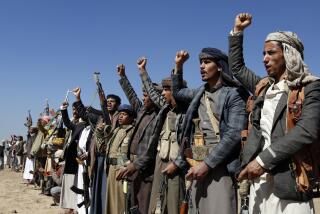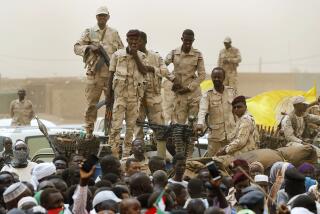3 Sudanese Officials Could Face Sanctions Over Darfur
- Share via
UNITED NATIONS — Three top Sudanese officials, including one regarded as a key U.S.ally in the war on terrorism, are under consideration for sanctions over the conflict in Darfur, according to a confidential U.N. document.
The list of 17 people includes Salah Abdallah Gosh, the Sudanese security and intelligence chief who has been a valuable counter-terrorism asset to the United States. The Bush administration has reportedly pushed to keep his name off the list.
The leaked roster opens a window on a usually secret and highly political sanctions process and highlights the conflict among Security Council members -- and even within Washington -- over the best way to compel Sudan’s government and rebel groups to stop the violence in the western region of Darfur.
A panel of experts submitted the list to a Security Council sanctions committee in December, nearly a year after the council voted to punish those who are fueling attacks by largely Arab militias that have killed tens of thousands and displaced more than 2 million people in the last three years. The conflict began after non-Arab rebels attacked government forces in 2003 to press demands for more equitable treatment.
The list was published Friday in the online edition of the liberal journal The American Prospect. The Security Council ultimately decides who will be designated for sanctions, probably a ban on travel or the freezing of foreign assets.
The two other Sudanese officials listed are its interior and defense ministers. Sudan’s president, Omar Hassan Ahmed Bashir, and the president of neighboring Chad, Idriss Deby, are on a secondary list of five people being considered for possible future sanctions.
The Security Council on Monday will discuss whether to move forward on sanctions against the 17 people. Several members, especially Qatar and China, have argued that punishing senior leaders would weaken the fledgling unity government on the brink of implementing a long-sought peace agreement. Qatar also represents Arab interests on the council, and China’s long-standing opposition to sanctions in general may be bolstered by its oil interests in Sudan.
The Bush administration has had an internal debate over whether to pursue “constructive engagement” or ramp up pressure through sanctions to halt violence, especially after it deemed the attacks by government-backed militias genocide in 2004.
Sudan, once home to Osama bin Laden, has provided valuable intelligence and assistance to the United States since the Sept. 11 attacks.
“The United States has resisted singling out particular regime members for any kind of accountability or sanctions since the beginning,” said John Prendergast, a senior advisor to the International Crisis Group, who has done much to focus international attention on the Darfur conflict. “It’s going to require positive action by one or two members, and everyone is looking to the United States.
The leaked list may increase pressure on the government and rebels to halt violence in Darfur, diplomats said. Interior Minister Elzubier Bashir Taha, Defense Minister Abdel Rahim Mohamed Hussein and Gosh, the intelligence chief, were listed for failing to disarm government-controlled militia groups under a 2005 agreement. Gosh was further charged with command responsibility for acts of arbitrary detention, harassment and torture by security and intelligence officials under his control.
Taha, the interior minister, told Reuters in Khartoum on Thursday that he was not aware he was on the list and would be “surprised ... and then I’d be angry” if it was true. He then suggested that President Bush belonged on a sanctions list.
Some names are conspicuously absent, such as that of Vice President Ali Osman Taha, identified by human rights groups as the architect of the systematic attacks on villages by government-sponsored militias. Also missing are key leaders of those militias, known as janjaweed, although three leaders of Darfur’s main rebel group, the Sudan People’s Liberation Army, are named.
“The leak is not good for us,” said Maria Telalian, the deputy ambassador from Greece, the country that chairs the Sudan sanctions committee. “It is up to us to decide whether these names should appear on the list for sanctions. It is a political process, and it takes a lot of factors into consideration.”
The circulation of the list also will raise questions if names drop off. Diplomats who requested not to be identified said that the United States was seeking to exclude Gosh, who traveled to Washington to meet with CIA officials last April.
U.S. Ambassador John R. Bolton would not answer questions about specific names on the list Thursday but said, “We’re farther out front than any other council member in pushing for a sanctions decision.”
David Shinn, director of East African affairs at the State Department from 1993 to 1996, said that, assuming the list was accurate, it would “clearly create problems for any ongoing contacts that exists between those people and the U.S. and any foreign governments.”
Shinn said the U.S. “would not want to cut off the counter-terrorism relationship and would probably try to work around” the list.
Farley reported from the United Nations and Silverstein from Washington.
More to Read
Sign up for Essential California
The most important California stories and recommendations in your inbox every morning.
You may occasionally receive promotional content from the Los Angeles Times.













